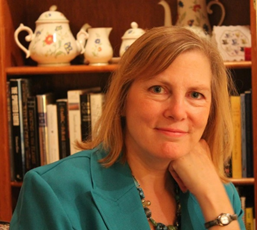Jennifer Sax
Director of Communications, Good Shepherd Community Care
By Val Walker
1. What sparked your interest in having conversations about our end-of-life care?
When I was 14, I began volunteering for a hospice in Maine where my mother worked as a nurse—and she still is a hospice nurse. Even as a teen, and throughout my life-- both personally and professionally, I have witnessed how having conversations about one’s end-of-life wishes has impact on the way we live our lives. These conversations are not just about dying. They are about how we want to live until we die. They are about taking responsibility, expressing our values and advocating for our care.
2. What are the most important reasons for having conversations with our loved ones and providers about the end of our lives?
Studies consistently report that one of the single most important factors in whether patients and family members report a positive end-of-life experience is whether or not they have had a conversation with their family and loved ones about their wishes. We find that when people have had these conversations, caregivers and loved ones suffer less complicated grief – and have less guilt, confusion and stress.
As providers, by initiating “the conversation” we have the opportunity to significantly and effectively change the kind of care people receive.
I’m a firm advocate for having these conversations from an early age. Life can be unpredictable and it’s never too late, until it is. The earlier and more frequently we can be having these conversations the more comfortable we will become and the less likely we are to end up making decisions in crisis.
3. As a communications professional, how do you currently advocate for having end-of-life conversations?
As part of my role in directing the programming of Good Shepherd Institute, I frequently have the opportunity to raise awareness and promote community dialogue around end-of-life issues and planning. I believe that we are in the midst of a pseudo “social revolution” towards increasing people’s comfort with end-of-life issues ---advance care planning is an integral piece.
There are lots of wonderful organizations out there doing this work. I recently participated in a new media campaign for The Conversation Project and we have had the pleasure of hosting its founder, Ellen Goodman, at one of our Institute Dinners. Good Shepherd is also a partner of Honoring Choices Massachusetts and we participate annually in National Healthcare Decisions Day (April 16th) by sponsoring community programming and education. This year we are hosting “Who’s Your Proxy” as a fun and interactive way to take some of the “edge” and stigma away from these topics.
4. Because you’re so active in teaching the importance of end-of-life conversations, how do you envision the healing role of conversation in general for health care?
With the influx of the electronic medical record and changing health care regulations, I believe we have been at risk of discouraging conversations between patients and providers. That said, there are advocates for change out there (Dr. Atul Gawande, Being Mortal) and certainly some Medicare reform that speaks to the importance of these conversations. The bottom line is that I think people need to be advocates for themselves and know that they can “open the door” to these conversations – not only with family and loved ones, but with providers as well. For so long we have been a society focused on cure. Having these conversations is about shifting our focus to what is truly important.
I couldn’t agree more, Jennifer. Thanks so much for speaking with me today!
I found Jennifer’s training resources for end-of-life conversations to be very helpful, and have listed below the links, for further reading:
Good Shepherd Community Care
http://www.gscommunitycare.org
The Conversation Project, and Founder, Ellen Goodman
www.theconversationproject.org
National Health Care Decisions Day (April 16, 2016)
Honoring Choices Massachusetts
http://www.honoringchoicesmass.com
The Institute for Healthcare Improvement
Val Walker, MS, is the author of The Art of Comforting: What to Say and Do for People in Distress (Penguin/Random House, 2010). Formerly a rehabilitation counselor for 20 years, she speaks, teaches and writes on how to offer comfort in times of loss, illness, and major life transitions. Her next book, 400 Friends and No One to Call: Breaking Through Isolation and Building Community will be released in March 2020 by Central Recovery Press.
Keep up with Val at www.HearteningResources.com





